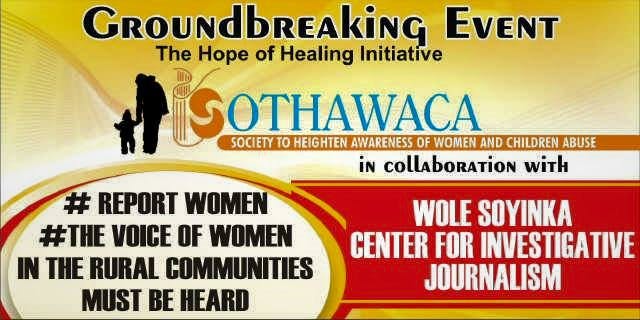Implications and Causes of Violence: Key Findings
May 28, 2019
Story

In Aviele a community situated along the expressway along the ever busy Auchi – Abuja Road in Etsako Central Local Government Area of Edo State Nigeria, concerted efforts by my organization Society to Heighten Awareness of Women Abuse (SOTHAWACA) and other relevant stakeholders to effectively tackle the menace of Violence Against Women (VAW) has been marred by the lack of accurate and reliable data during a recent groundbreaking in that community.
Surveys are currently been carried out to measure the prevalence, nature and consequences of physical, emotional and sexual violence against women and the girl child. One fact that cannot be faulted is that violence against women and the girl-child at home and at work place has surprisingly taken a very alarming trend and different dimensions. Sometime in the year 2000, United Nations stated that “it is equally a major threat to social and economic development of any community. Also in the year 2000, DFID stated that it is also the most widespread and socially tolerated way in which women and girls are denied their basic right.
A good majority of persons are of the opinion that when looking at issues on violence against women, there is always an argument that women’s vulnerability to violence is determined by their sexuality, resulting for example in rape or female genital mutilation (FGM).This argument is based from their relationships to some men and from membership of groups where violence against women is a means of humiliation directed at specific groups (e.g. mass rape in conflict situations). I begin to wonder why violence against women is seen as been reinforced by doctrines of privacy and the sanctity of the family, and by legal codes which link individual, family or community honor to women’s sexuality. The greatest cause of violence against women is seen in government tolerance and inaction.
The inhibition of women’s social and political participation is the result of gross fear. Fear therefore can be seen as the most significant consequence of most women’s activities. Sexual violence plays a prominent role when viewing violence against women and girls which today occurs on a vast scale. Often times, sexual violence appears in literature but its definition is broad. Sexual violence describes the deliberate use of sex as a weapon to demonstrate power over, and to inflict pain and humiliation upon another human being. Therefore, sexual violence does not only include direct physical contact between perpetrator and victim; it may also include threat, humiliation, and intimidation as the case may be. I discovered that income, families, and social support deprives women and girls the capacity to generate income as a result of which many are forced into transactional or commercial sex in order to maintain certain level of livelihood/comfort. It is widely acknowledged that the impacts of HIV/AIDS in this rural livelihood are not gender neutral, its deepen and widen gender inequalities.
HIV/AIDS is creating a major shock in Aviele. For the most part, these changes are increasing the vulnerability of the most vulnerable (women and children) and increase the already stark gender inequality in the access to productive or meaningful resources. According to FAO (2004) HIV/AIDS reinforces mechanism of marginalization and inequality. In addition, it shows that policies intended to benefit the poorest or most vulnerable may not be effective unless they address the mechanisms of exclusion (FAO, 2004).
Many women I talked with based their activities Women’s lack of access to financial resources. Due to this, they find themselves becoming dependent on men for support. This they claim is the result of why they are faced with the risk of being subjected to sexual abuse. Therefore, the low social status of women in this community magnifies their vulnerability to HIV/AIDS infection and constrains their ability to deal with its impact.
Worth noting is the fact that I discovered that the women had very limited economic security. This therefore is the reason for the increased likelihood of many engaging in high risk behaviors such as commercial sex work or transactional sex. All around the truck stops, I noticed young girls, ladies as well as women who are sexually active (through choice or necessity) are often exposed to different forms of sexual violence resulting in some having differing levels of HIV infection.
Coming from this community, a very pressing came to my mind. I began to ask myself why socio-cultural factors promote domestic violence. About 50% of people I spoke with blame it on the very domineering attitude of men. This is in agreement with the views expressed that in the rural and urban communities in Nigeria, the exploitation of women are perpetuated, where the relationship between men and women is that of senior-junior. Studies have shown that at the societal level, the discrimination of women is traceable to male authority and decision making in the home, rigid gender roles, definition of masculinity that are linked to dominance or male honor, economic inequality between men and women, and the use of physical force for conflict resolution.
Apart from this, 46.66% of the respondents agreed that sex role socialization promotes domestic violence, which means that women are not complete without a man or there is no equality between men and women. Although wife beating is a global phenomenon, it is accepted as part of our culture one aged woman told me. This is reinforced by the concept of sex role socialization of women, which encourages and emphasizes submissiveness, and divorce is not always a viable alternative due to stigma attached to it.
With this very interestingly I was given reason as why domestic violence exists. It can be seen that the deep rooted attitudes regarding socially and culturally prescribed roles, responsibilities and trait of men and women are primarily attributes of domestic violence. It is generally assumed that women are responsible for maintaining peace and harmony within the family, and in family relations women are considered subordinate to men. As many as 48.20% of the respondents opined that societal norms promote domestic violence, for instance, wife must show respect or reference to all male members of the family irrespective of their age.
Also, 40.50% of the respondents strongly agreed that political marginalization of women promotes domestic violence .No wonder Nigerian women are underrepresented in the political arena, in the public or private sectors, which lower their status in the society. Moreover, 63.10% strongly disagreed that being married to a woman does not give her husband the right to physically chastise their wives, whenever they consider it necessary to do so. I hear that there is a contrary clause that the laws in Nigeria allow husbands to reasonably chastise their wives.
Does religion condone domestic violence? 42.60% of respondents posited that religious teaching did not promote domestic violence. This negates the inference drawn to the subservient role to the woman. Also, as much as 55% of the respondents were in agreement that statistics available through underreporting of incidence of domestic violence by police, women centers or formal institutions often underestimates level of violence. This is because of the hidden nature of the problem accurate statistics on it are hard to come by.
It can therefore be concluded that from all that has been written that:
- Most of the domestic violence experienced by women in their households or in the community goes unreported by the respondents.
- The general consensus among the respondents is that socio-cultural factors promote domestic violence in the study area.
- The most striking coping strategies adopted by the women to ameliorate domestic violence were not fighting back or confronting the perpetrators and remaining silent. I would want to recommend the following:
- Media should be used to sensitize public about domestic violence so as to develop a positive attitude towards women in general and women who fall victims of domestic violence should be well addressed;
- Women should be enlightened on how to get in touch with women`s commission offices in the event of domestic violence. Moreover, these offices should be opened at the state and community levels.
- Women volunteers should be encouraged to register their names with the commission; they can then be organized as a group in order to take up development program.
- Dismantling the patriarchal structures that reinforce power imbalance between men and women.




